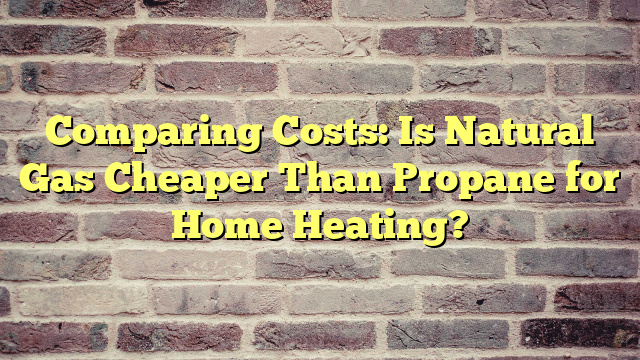Comparing Costs: Is Natural Gas Cheaper Than Propane for Home Heating?
Comparing Costs: Is Natural Gas Cheaper Than Propane for Home Heating?
When it comes to heating your home, the choice between natural gas and propane is a common dilemma. Both fuels have their advantages and disadvantages, but cost-effectiveness remains a crucial factor for many homeowners. This article delves into the costs associated with natural gas and propane, aiming to help you make an informed decision on which is cheaper for home heating.
Understanding Natural Gas and Propane
Before comparing the costs, it’s essential to understand what natural gas and propane are and how they are used in home heating.
Natural Gas
Natural gas is a fossil fuel composed mainly of methane. It’s delivered to homes through an extensive network of pipelines. Natural gas is popular for heating due to its convenience and relatively lower cost in areas where the infrastructure is already in place.
Propane
Propane, also known as liquefied petroleum gas (LPG), is a hydrocarbon fuel that comes in liquid form. It’s stored in tanks and delivered to homes, typically in areas where natural gas pipelines are not available. Propane is praised for its high energy efficiency and portability.
Cost Comparison Factors
Several factors influence the cost of heating with natural gas and propane. Understanding these can help you make a more accurate comparison.
1. Fuel Efficiency
Propane contains more energy per unit than natural gas, making it more efficient for heating. However, efficiency also depends on the heating system used.
2. Price Fluctuations
The prices of both natural gas and propane fluctuate based on market demand, production levels, and geopolitical factors. Propane prices can be more volatile due to its global market, whereas natural gas is often influenced by local market conditions.
3. Infrastructure and Delivery
The availability of natural gas pipelines and the need for propane delivery and storage tanks can affect the overall cost. Installation and maintenance of propane tanks add to its cost, while natural gas has a lower infrastructure cost if pipelines are already available.
Comparing the Costs
To compare the costs of natural gas and propane for home heating, let’s look at some average prices and efficiency factors.
| Fuel Type | Average Cost (per million BTU) | Efficiency Factor |
|---|---|---|
| Natural Gas | $10 | High |
| Propane | $15 | Higher |
Note: These prices are illustrative and can vary significantly based on location, market conditions, and other factors.
Which Is Cheaper?
Based on the table above, natural gas appears to be cheaper than propane when comparing the cost per million BTU. However, the actual cost to the homeowner will depend on the efficiency of their heating system, the cost of installation and maintenance, and the fluctuating prices of fuel.
Considerations for Choosing Between Natural Gas and Propane
- Availability: If natural gas is readily available in your area, it might be the more cost-effective option due to lower infrastructure costs.
- Efficiency: Consider the efficiency of your heating system. High-efficiency propane systems might offset the higher cost of the fuel.
- Environmental Impact: Some homeowners might choose a fuel based on its environmental footprint. Natural gas burns cleaner but is a potent greenhouse gas if leaked.
- Price Stability: If you’re concerned about price fluctuations, natural gas might offer more stability in certain regions.
Conclusion
Deciding whether natural gas or propane is cheaper for home heating involves considering various factors, including fuel prices, efficiency, infrastructure, and personal preferences. While natural gas generally offers lower costs per unit of energy, propane’s higher efficiency and availability in areas without natural gas infrastructure make it a competitive option. Ultimately, the best choice depends on your specific situation, including your home’s location, heating needs, and environmental considerations.

